Category: Sustainability
Digitalize in Stockholm 2023 – Poster Presentation
Today I gave a poster presentation of my postdoctoral research project at Digitalize in Stockholm 2023. As its only my second month on the new job, the poster is focused on a general overview and two projects I’ve recently begun: Seasonal Craft Implosions (on the poster called A Year of Seasonal Crafts) and Toying with Relations. I had some really lovely conversations regarding taking children (and play) seriously and explorative research methods.
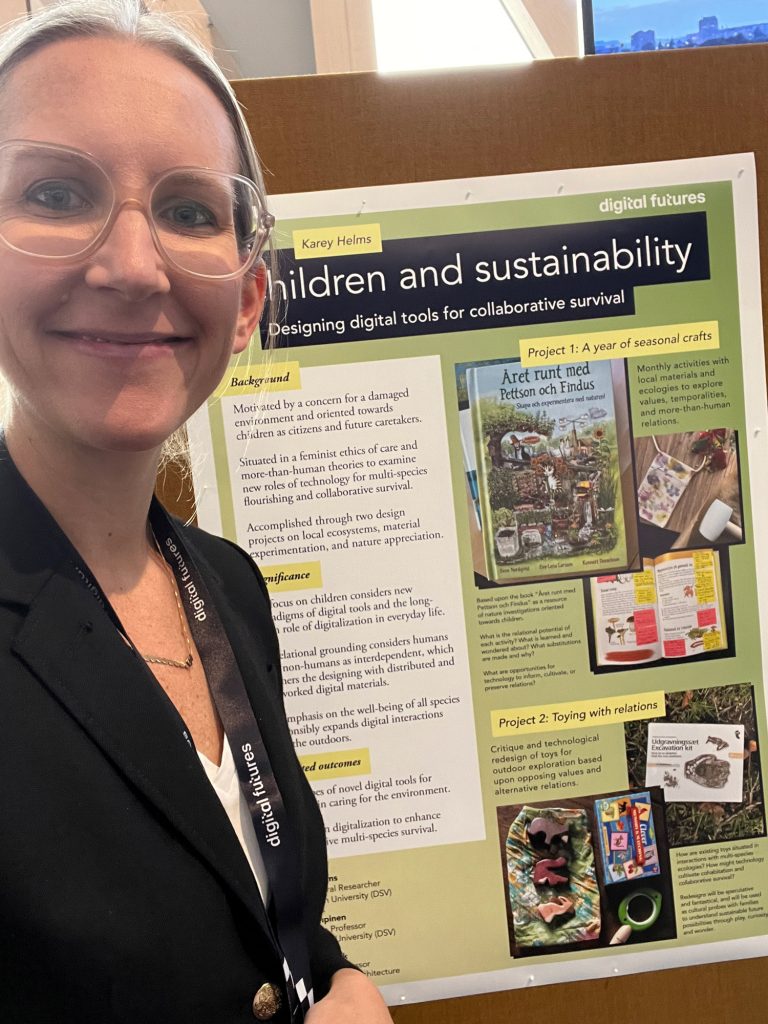
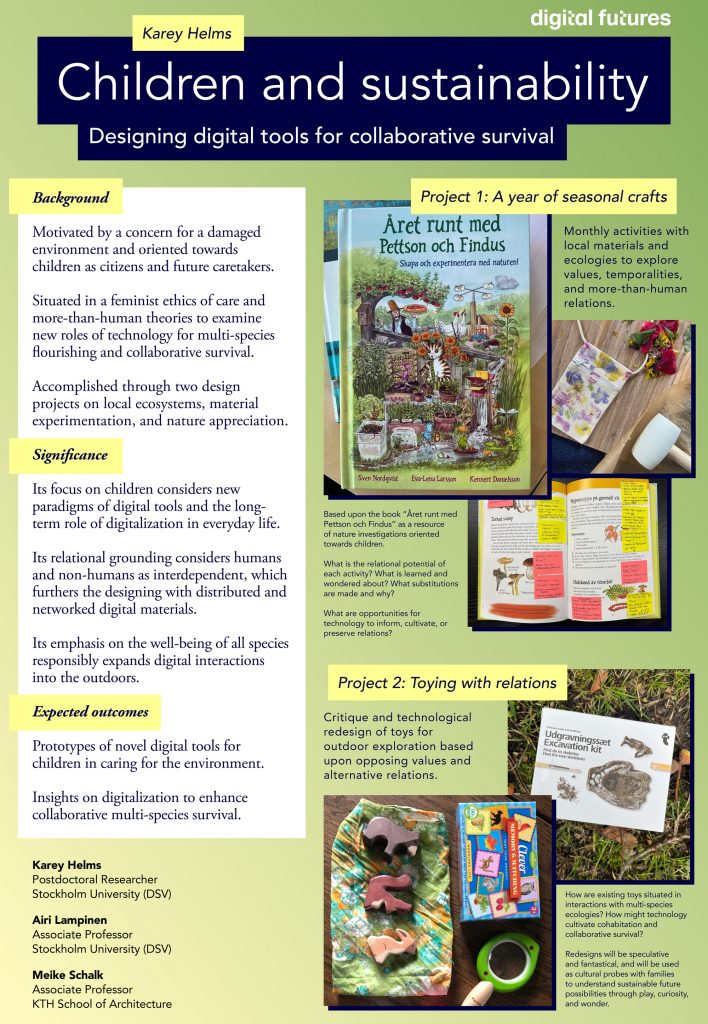
Dr. Helms
What a privilege on Monday to have my doctoral work presented by Laura Forlano, and deeply engaged with by her and committee Danielle Wilde, Elvin Karana, and Carl DiSalvo (and Martin Avila). Elated, exhausted, overwhelmed, overjoyed, tired, and energized are just a few of the ways I feel. So thankful for the incredible support from everyone near, far, in person, and online. ~ Dr. Helms
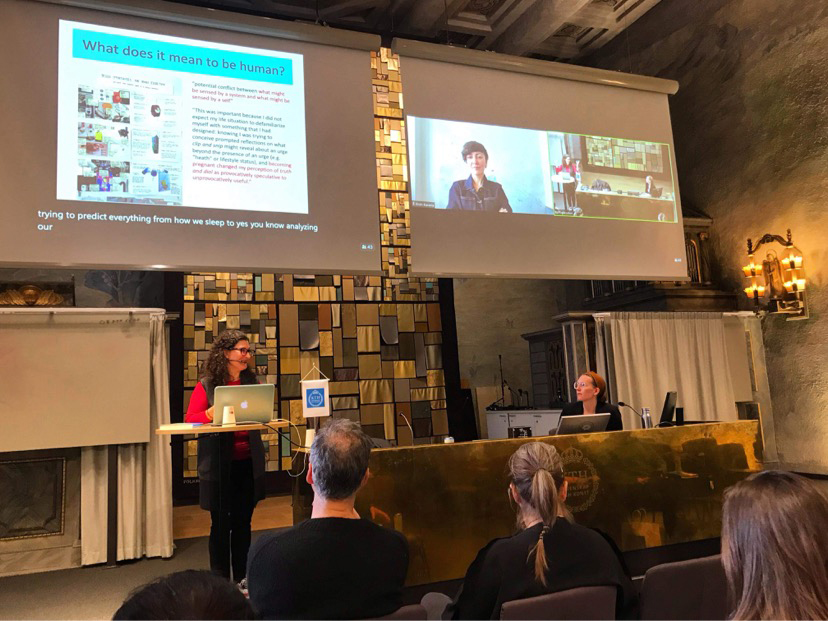
PhD defense!
On Feb 6th 13.00, I’ll be taking a brief intermission from parental leave 👶 to defend my thesis “Designing with care: Self-centered research for interaction design otherwise” ✨ Welcome to join: Kollegiesalen, Brinellvägen 8, Stockholm or on Zoom (https://kth-se.zoom.us/j/67699289253). Abstract below and PDF here!
Opponent: Laura Forlano
Committee: Danielle Wilde, Carl DiSalvo (virtual), Elvin Karana (virtual), Martin Avila
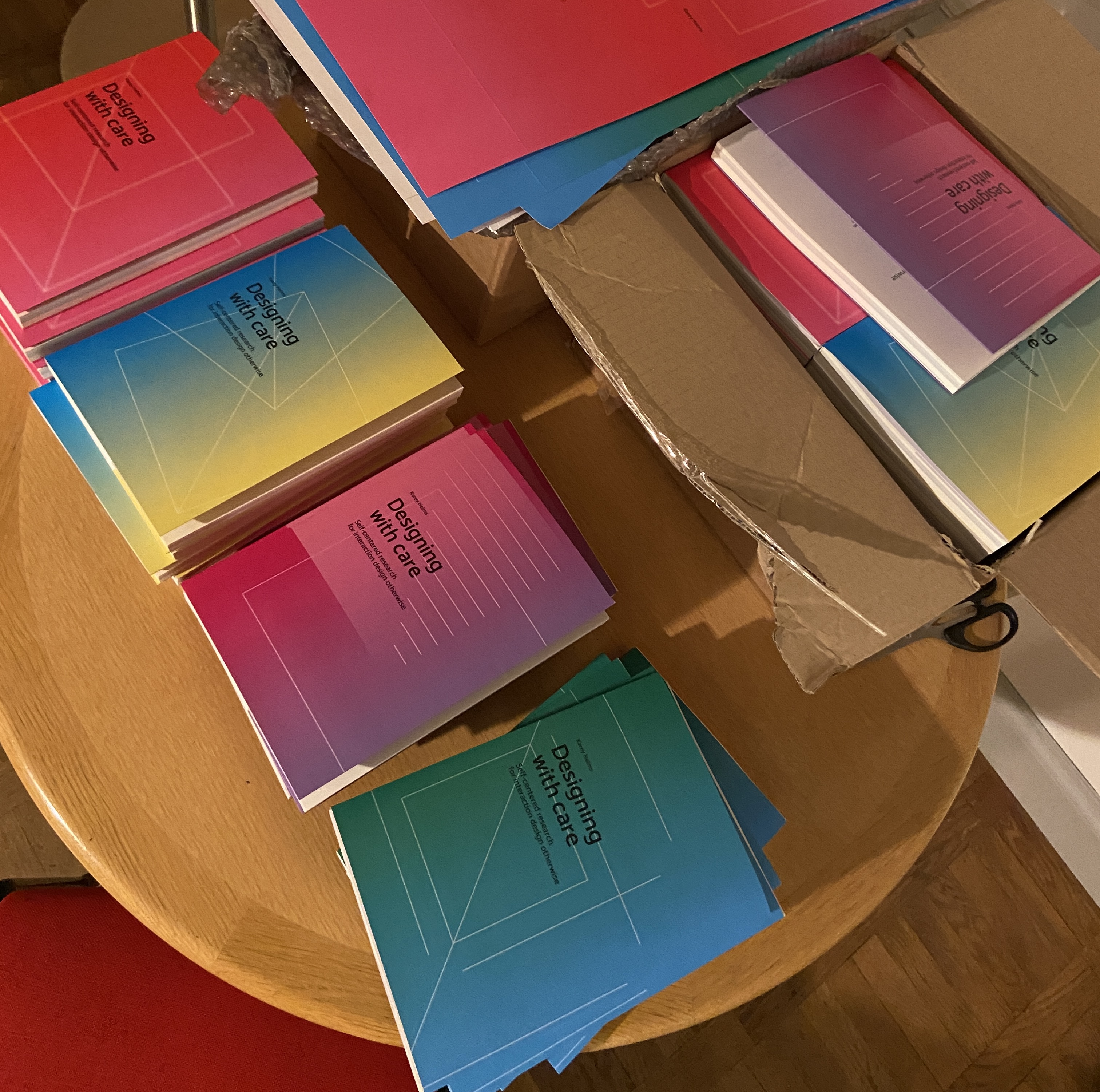
Designing with care: Self-centered research for interaction design otherwise
This dissertation is about the research program designing with care as a pathway towards interaction design otherwise amid a world in crisis. Considering how established ways of doing interaction design will change involves recognizing the role of digital materials in social injustice and systemic inequality. These concerns are inseparable from the material complexity of interactive experiences and their more-than-human entanglements in care. Through five design experiments, I explore everyday human care as wickedly attending to some care doings and not others, and an intimate and generous questioning of oneself as human.
I offer four contributions for interaction designers and design researchers. The first contribution is designing with care. This research program draws upon care ethics and posthumanism to establish four axioms: everyday, wickedness, intimacy, and generosity. Within this programmatic framework, the second contribution is definitions of wickedness and generosity as ethical stances that can be taken by designers and researchers. The third contribution is the synthesis of my four methodological approaches: auto-design, spatial orientations, leaky materials, and open speculations. Each is a generative and analytical pathway towards more sustainable and just futures. The fourth contribution is five careful designs as prototypes of what interaction design otherwise might be like: technologies of human waste, spying on loved ones, leaky breastfeeding bodies, scaling bodily fluids, and a speculative ethics.
From my research program and contributions, I discuss disciplinary resistances to suggest three possibilities for how I argue interaction design should change: engaging with mundane yet unrecognized topics, doing design work where the consequences would be present, and reconsidering how the formats of research publications could better reflect positionality. I then reflect upon the relevancy of self-centered research in moving beyond oneself for more sustainable worlds.
CHI 2022 – Publications
A little over a week ago, I had two papers published at the ACM CHI conference and a position paper shared at the workshop Feminist Voices about Ecological Issues in HCI. Check them out!
Karey Helms. 2022. A Speculative Ethics for Designing with Bodily Fluids. ACM Conference on Human Factors in Computing Systems Extended Abstracts (CHI 2022, alt.chi) New Orleans, LA, USA.
PDF, DOI, Video (8 min), Video (30 sec)
Pedro Sanches, Noura Howell, Vasiliki Tsaknaki, Tom Jenkins, and Karey Helms. 2022. Diffraction-in-action: Designerly Explorations of Agential Realism Through Lived Data. ACM Conference on Human Factors in Computing Systems (CHI 2022), New Orleans, LA, USA. (Best Paper Honorable Mention Award)
DOI, Video (8 min), Video (30 sec)
Karey Helms. 2022. Site-writing around Breastfeeding. ACM Conference on Human Factors in Computing Systems (CHI 2022, Position paper) Workshop “Feminist Voices about Ecological Issues in HCI”, New Orleans, LA, USA.
PhD 90% Seminar
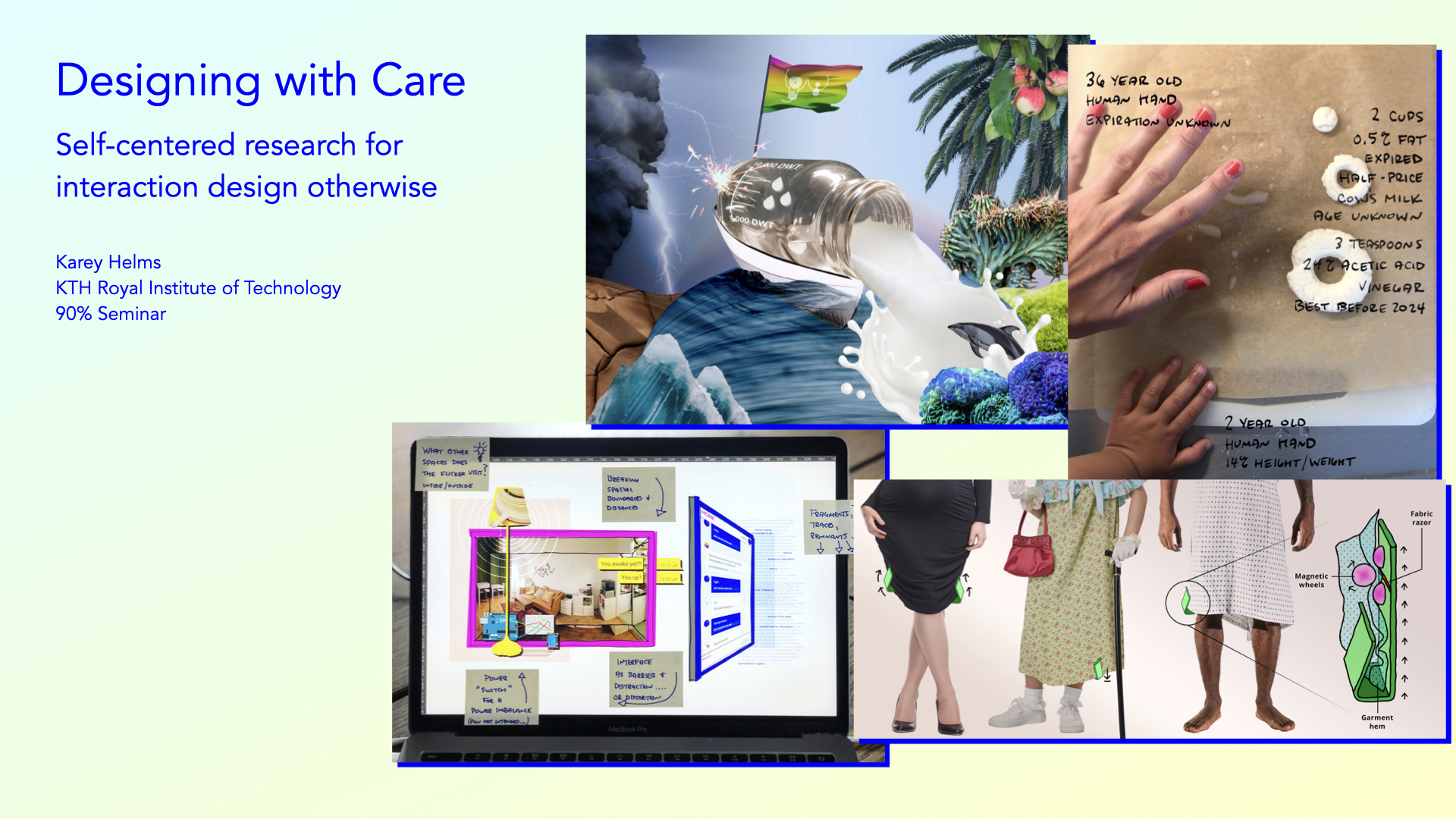
This week I had my 90% (“final”) seminar with Heather Wiltse from Umeå Institute of Design. I’m very appreciative of her engagement with my work and difficult questions that energized me for my next few months of writing. The tentative title and abstract of my thesis below:
Designing with care: Self-centered research for interaction design otherwise
This dissertation is about the research program designing with care as a pathway towards interaction design otherwise amid a world in crisis. Considering how established ways of doing interaction design will change involves recognizing the role of digital materials in social injustice and systemic inequality. These concerns are inseparable from the material complexity of interactive experiences and their entanglements in care. Through five design experiments, I explore wickedly attending to human everyday care, and an intimate and generous questioning of oneself.
I offer four contributions for interaction designers and design researchers. The main contribution is designing with care. Within this programmatic framework, I contribute extended articulations of wickedness and generosity. The third contribution is the synthesis of four methodological approaches: auto- design, spatial orientations, leaky materials, and open speculations. Each is a generative and analytical pathway towards five careful designs as prototypes of what interaction design otherwise might be like: technologies of human waste, spying on loved ones, leaky breastfeeding bodies, scaling bodily fluids, and a speculative ethics. From these, I discuss disciplinary resistances and personal struggles to reflect upon implicating oneself within more-than-human care, and consider the benefits and limitations of designing with care in moving beyond self-centered research towards more sustainable worlds.
Nordes 2021 – Exploratory Paper
Had a wonderful time this week (virtually) attending my first Nordes conference! In addition to attending the wonderful workshop Life Stories for Collaborative Survival, I also presented the exploratory paper Scaling Bodily Fluids for Utopian Fabulations, a design collaboration with Marie Louise Juul Søndergaard and Nadia Campo Woytuk. Slide GIF below. Very much hope to attend future Nordes conferences!
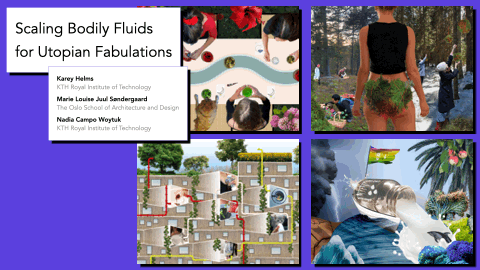
Scaling Bodily Fluids for Utopian Fabulations through Collage-Making
WORKSHOP CALL FOR PARTICIPANTS – On May 18th at 14.00 CET, join Nadia Campo Woytuk, Marie Louise Juul Søndergaard, and me in an online workshop at this year’s Uroboros festival: Scaling Bodily Fluids for Utopian Fabulations through Collage-Making!!
NordiCHI 2018 – Presentation & Slides
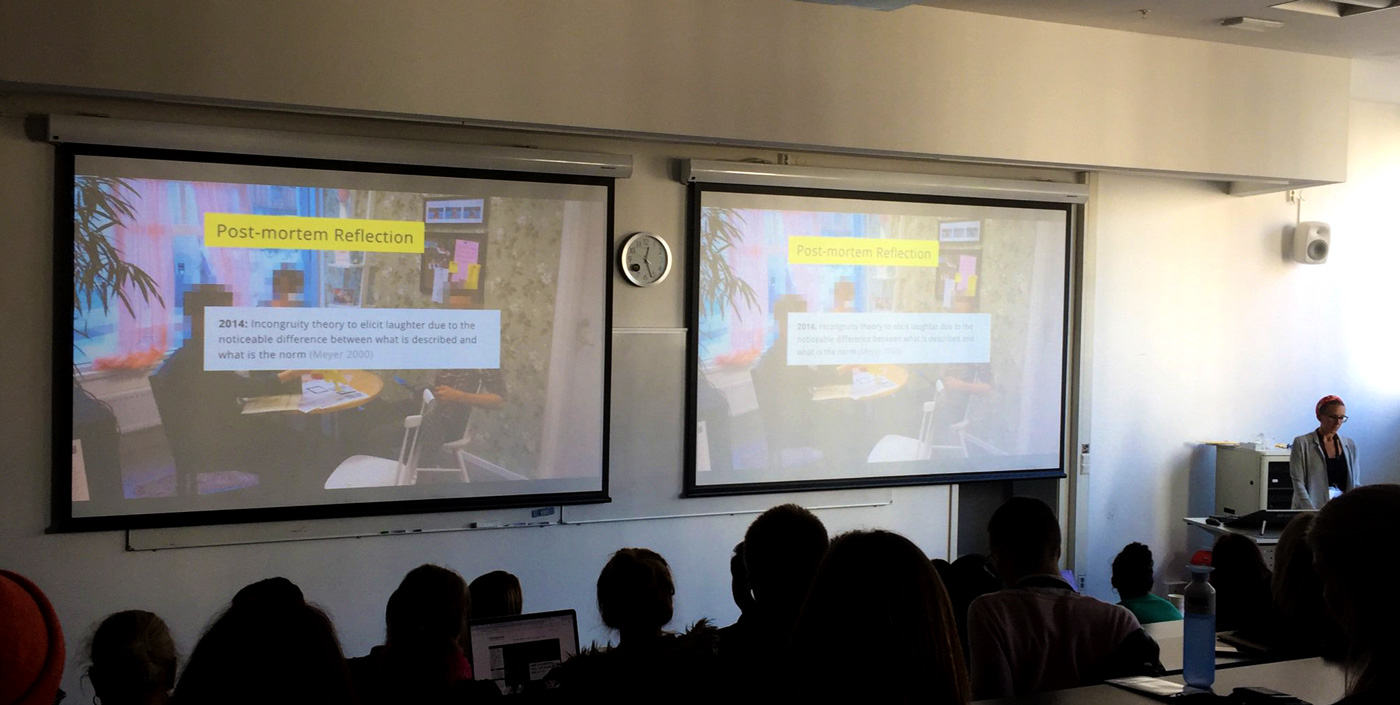
Early this week I presented a paper written with my PhD supervisor Ylva Fernaeus on the use of Humor in Design Fiction to Suspend Disbelief and Belief at NordiCHI 2018 in Oslo. This paper was part of the future scenarios track at NordiCHI, an excellent initiative and venue that explores the design of design fictions. Our paper contributed (1) a way in which humor might be used in design fiction (and design more broadly), (2) a design process that includes fieldwork to inform the design of design fictions, (3) and a human-scale design fiction as a method of communication and dissemination. For the presentation, I originally intended to role-play the paper presentation as a character from the fictional world, as I did when presenting the same project four years ago in Umeå as my master’s thesis, but last minute opted to not because of the opening introductions by moderators. Instead, I opened the presentation by jumping into the fiction with no context, and then gradually introduced more information and built reflections throughout the remaining of the presentation. I think this structure worked very well. The full paper is available here and the presentation below.
NordiCHI 2018 – Accepted Paper (Future Scenarios)
Very excited to have a NordiCHI 2018 paper accepted in the future scenarios track! Written with Ylva Fernaues, my supervisor at KTH, the paper is about why and how I used humor in my MFA thesis at Umeå Institute of Design four years ago.
Karey Helms, Ylva Fernaeus. 2018. Humor in Design Fiction to Suspend Disbelief and Belief. ACM Nordic Conference on Human-Computer Interaction (NordiCHI 2018), Oslo, Norway.
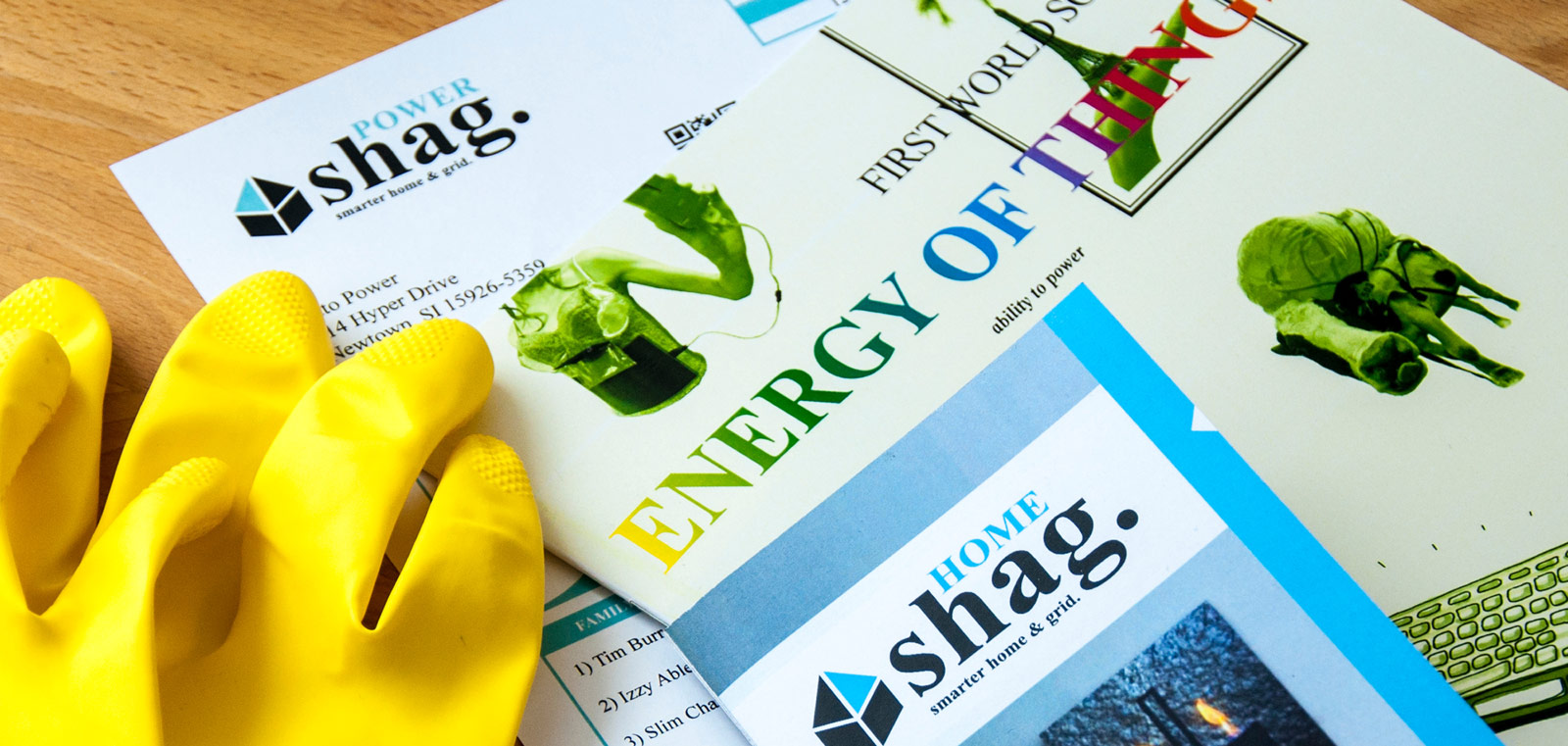
Humor in Design Fiction to Suspend Disbelief and Belief
This paper investigates humor as a resource and strategy for design with discourse as an intended outcome. While humor can incite empathy and understanding, it can also lead to alienation and disengagement. Through the detailing of the pre-narrative and narrative processes of an exemplar design fiction we describe why and how elements of humor, in particular puns, parody, and pastiche, were employed. Following the presentation of the fiction and its use in the design of an exhibition and diegetic prototypes, the paper presents responses from participants and audience members to reflect upon how humor was received within the design fiction. Following these reflections, as the near-future scenario was written four years prior to this paper and is now situated within present-day, it then concludes with a post-mortem reflection on the floating nature of humor.
Tracking and Tracing in a Circular Economy
This past Monday I attended an event at Fab Lab London organized by RSA The Great Recovery on Pushing the Bounds of Materials and Information: Tracking and Tracing in a Circular Economy. Though the event was advertised as a workshop, it unfolded as a speaker series as the majority of the day was devoted to a range of practitioners working within the overarching theme. The morning began with Tomas Diez of Fab Lab Barcelona, who in addition to presenting a variety of relevant works with a focus on the open source Smart Citizen project, gave a presentation on societal transformations throughout the different industrial ages and highlighted the shift of consumers to producers in contemporary society. Next up was Alan Dukinfield of S2S Lifecylce Solutions, during which he and his colleague provided an insight into the technical installation, usage, barriers and potential futures of a RFID material tracking system in a commercial context. After lunch we took a turn into textiles, hearing from Rien Otto from Dutch aWEARness, and Dr Kate Goldsworthy and Miriam Ribul from Chelsea College of Arts and TED (Textile Environmental Design). The former focused on current practices of their own Circular Content Management System from a larger industry perspective and introduced new textile sorting technologies used by others. The latter focused on the designer’s role and the importance of their understanding of the potential implications regarding material choices and design decisions. In addition, Miriam presented an interesting research project investigating the potential of individual textiles fibers embedded with dynamic information. The day wrapped up with a short introduction into setting up and gathering data from the Smart Citizen kit.
Thoughts & Reflections:
While I was very impressed with the range of speakers regarding the circular economy, I wish there would have been significantly more time devoted to ‘workshopping’ – whether in the form of smaller group brainstorms or specifically diving deeper into the Smart Citizen kit. I say this not only because of my innate urge to get hands-on, but also because consistent questions emerged regarding the barriers of long term behaviour change, acceptance and implementation of these new processes, practices and technologies within society and systems. I felt these obstacles were begging to be explored. For example, in regards to the Smart Citizen kits, Diez discussed the challenges of engaging communities to sustain the use of the sensors, including creation of trust around the sensors and their data. Within tracking technologies, interesting points regarding disruptive human behaviours were raised, like the innocuous act of removing a clothing label from one’s own garment inaccurately deeming the end of a product’s lifecycle. At a more systemic level, I would have loved to learn more and brainstorm around the implementation of the UK’s PAS 141, a process management specification for the re-use of used and waste electrical and electronic equipment.
That all being said, I’m assuming they realized as well the difficulty of fitting in a wealth of content plus a formal workshop in a single day. Hence, a followup event once again at Fab Lab London with a much more hands-on focus.
Leaving Notes & Quotes:
- Diez – “Access to tools… to make tools… to make cities smarter.”
- Dukinfield – “Intelligent Product: A product whose information content is permanently bound to its material content and which is able to influence decisions made about it.”
- Goldsworthy – “Products as systems… impacts beyond the objects we design.”
Sustainable Futures at Inside/Out Festival
Not really having any idea what I was signing up for, on Tuesday I attended the Sustainable Futures breakfast salon at the Somerset House by Editorial Intelligence as part of the Inside/Out Festival. The morning included three brief introductions by a guest panel comprised of Jim Haywood, Sandy Black and Olivia Knight followed by casual questions and discussion.

As my recent thesis incorporated similar themes regarding sustainability, consumerism and the individual vs the collective’s relationship with energy – I’m quite critical on the topic. That being said, I found Haywood’s and Black’s perspectives rather trite. While obviously an extremely knowledgable sustainability consultant, Haywood presented a wealth of environmental statistics and projections that I believe alienate the individual from personal action due to the unintentional cross-over into environmental scare tactics. I’m personally against scare tactics for their growing overuse and potential desensitization to the topic, as well as their portrayal of this ‘larger than life’ problem in which it becomes too easy for an individual to view it as a global issue in which that can’t have an impact. Don’t get me wrong, climate change IS a very large global issue, I’m just being critical on how we inspire and instigate behaviour change and collective action. On the other hand, Haywood’s concluding analogy was strong and on point – wish he would’ve played it through his entire talk. He compared sustainability to climbing Mount Everest:
- Take the first step up the mountain, beginning with individual action
- Rope in the other climbers, to summit the mountain is a join initiative
- Scale the mountain, but be sure to enjoy the view and see that its worth it.
Professor Sandy Blank spoke from a fashion perspective, bringing a specific vantage point rooted in the dichotomy between fashion as an embedded cultural construct and its complex lifecycle problems. She highlighted the competing paradigms of aspirational (think Oscar gowns) verses FastCheapNow (think Primark), and how a growing shift toward the latter is resulting in shocking amounts of textiles waste. I could be wrong, but I don’t remember her mentioning all the other environmentally unfriendly practices embedded within the entire fashion supply chain (disclaimer: strict time restrictions on the talks), and felt she shifted a bit too strongly towards defending the positives of fashion – enabling self-confidence, social communication, etc. While these are valuable points, and myself as a fashion advocate believe in, I was left waiting for a disruptive solution. Maybe its me, missing the purpose of these talks, because they definitely lead to valuable discussions, but perhaps I keep naively awaiting an effortless answer…
…which was given by the third speaker, Olivia Knight. And it made my day. Knight is the founder of Patchwork Present, a website where friends and family can contribute to the one gift you really want, rather than buying you 25 you don’t want. She is the first to mention that collaborative gift giving isn’t a new idea, she just made it digital and easy. While I find Knight’s business innovative for disrupting an timeless tradition (gift-giving) by both modernizing and making universally accessible an existing solution (collaborative consumption), hearing her clearly articulated thoughts on consumption made me want to run up and give her a double high-five. She began with the tension between want and waste, highlighting our human nature to need or covet things. And we do need stuff, but “we don’t want to feel bad wanting.” Unfortunately though, we often consume what we don’t need and show our love for another by buying even more things we don’t need. Patchwork Present addresses the latter by facilitating collaborative consumption of the things, or thing, you really do want. Through this smarter consumerism, want is in turn celebrated, while I believe also taking an actionable step forward towards a more sustainable future.
Needless to say, I was impressed with Knight, and though perhaps critical on the morning as a whole, overall enjoyed the diverse perspectives and discussions.